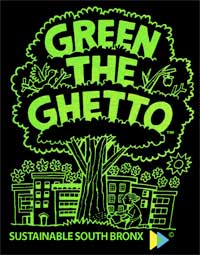
A low-income single mom takes her child to a high-cost emergency room for an asthma attack late at night. She is less productive at work the next day, and might get fired if it happens too often. She and her child are more likely to suffer from obesity and diabetes because trucks, poor air quality, and lack of local parks discourage healthy physical activity. Locating sewage treatment plants, power plants, coal mines, intensive truck traffic for hauling products and waste in her community may be expedient, but now she and her child are paying for that expediency in ways that the folks who benefit from those decisions do not.
Asthma, obesity, diabetes, poor real estate values, unemployment, inequality, even prison. Not the words you might connect with sustainability, but they are the costs of our free-market.
The South Bronx is what we call an "environmental justice community."

Environmental justice means no community should be saddled with more environmental burdens and less benefits than others. Race and class tell you where to find good stuff (like parks and trees) and the bad stuff (like power plants and waste facilities). We are the canaries in the coal mine, and have felt the problems for some time. Antiquated zoning and land use regulations are used to justify polluting facilities in politically vulnerable communities. We are regional sacrifice zones created to support our hyper-consumption society, and point sources for greenhouse gases but they are coming everyone's way.
Columbia University says proximity to fossil fuel exhaust sources, like power plants and trucking, causes learning disabilities in children. Statistically speaking, poor kids who do poorly in school, have a better chance at prison than higher education. What are we telling our kids?
Training people for green-collar jobs that improve the environment, provide meaningful employment, and a better quality of life help solve several problems at once.
The billions of tax dollars and private sector investment that exacerbate pollution-borne health conditions keep the revolving door of unhealthy communities and incarceration spinning.
Why aren't we trying to build monuments to hope and possibility, rather than tributes to our collective failures?